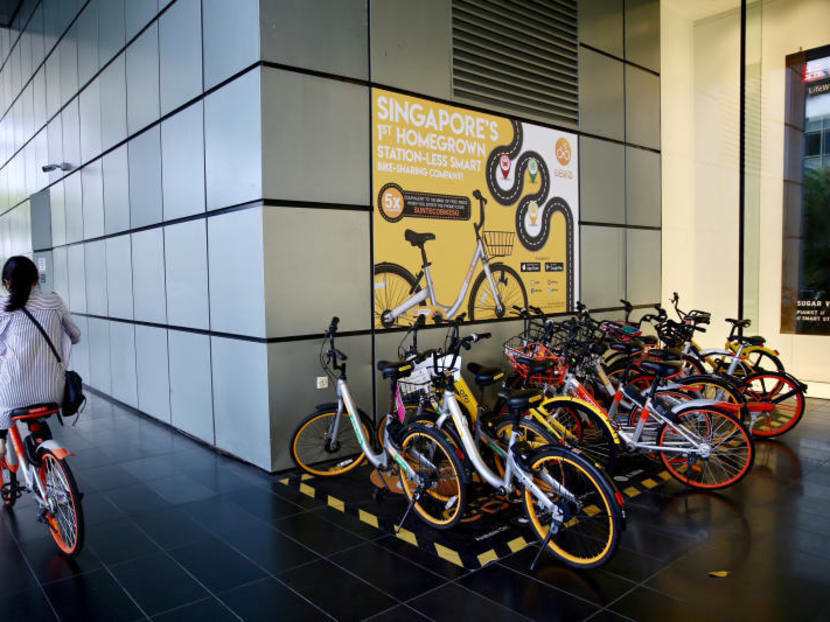New regulation drives bike-sharing operators forward, not burden them
One major impact of a licensing regime is that it could help the bike-sharing operators move away from the mind-set of always looking to adding bicycles and to focus more on managing their fleets efficiently. This could even be the key to a sustainable success for the operators.
The concept of bicycle sharing, in theory, fits well with Singapore’s push to be a smarter, greener, healthier and car-lite society.
Using smartphone apps and GPS tracking, users can rent, reserve and drop off bicycles on demand, wherever they choose.
It offers an apparently cheap and convenient solution to provide commuters with first and last-mile connectivity to the public transport network.
However, it is impossible not to notice the rash of yellow, orange and silver bicycles randomly parked at bus stops, void decks and pavements – spaces meant for public use. Some can even be found dumped in drains.
The rising problem of indiscriminate parking and the obstruction of public spaces has led to the Land Transport Authority (LTA) announcing that, as a solution, it will be introducing licensing regime for the operators. Under the new rule, an operator will be allowed to grow its fleet if the firm shows success in dealing with indiscriminate parking.
The regulator also said users who park their shared bicycles indiscriminately will be fined.
To promote responsible parking behaviour, LTA is planning to implement geo-fencing technology that requires users to scan QR codes at designated parking locations before the end of the trips.
It is an important move to quickly address the growing issue of indiscriminate parking.
Since the bicycles are occupying public space and create inconvenience to pedestrians, regulating the size of the bicycle fleet prevents operators from adding excessive bicycles on the road.
One major impact of a licensing regime is that it could help the operators move away from the mind-set of always looking to adding bicycles and to focus more on managing their fleets efficiently. This could even be the key to a sustainable success for the operators.
Our studies of bicycle sharing operators in the region indicate that most of the shared bicycle operators have not managed to resolve the supply and demand of vehicles – having bicycles at the location and time where demand is high.
In an NUS Business School study on user behaviour in car sharing firm car2go in San Diego, we found that by positioning vehicles to places that have higher user demand, we can not only improve utilisation rates and even reduce the size of the car fleet.
For instance, using optimisation models, we were able to predict people’s travel patterns in terms of time and location, and place vehicles in locations where the demand is higher.
Also, observers say the licensing regime would cast a burden on the operators. They are only partially correct. While there will be compliance costs, a licensing regime by nature protects the incumbents, because it raises the bar for new players and only impacts on the smaller players. Licensing could even soften the competition in the long run.
Will the operators pass the costs down to the users? It is unlikely in the short horizon, given the current competitiveness of the bicycle sharing industry in Singapore. Operators would not want to see their users switching to their rivals.
A REGULATOR’S ROLE
It makes sense for LTA to step in imposing penalties, as it would be difficult for a provider to impose fines on its customers, without forcing them away to competitors.
Under recent amendments made to the Parking Places Act, users caught for parking their shared bicycles indiscriminately more than three times in a year will be banned temporarily from renting from all bike-sharing operators.
But monitoring user activity could be a challenge for LTA. Under the licensing scheme, the regulator would have to access the user data of the operators and measure factors such as user demand and utilisation as well as parking locations.
There are presently six bicycle sharing operators and around 100,000 such bicycles in Singapore. For effective monitoring, LTA would need to have real-time access to the operators’ data.
This requires resources and the challenge will be for LTA to track and analyse the movement of the bicycles. LTA also need to come up with measures to prevent operators from manipulating data.
Also, the new measure of scanning QR codes to verify legal parking creates an additional layer of the user experience and could cause inconvenience for the bicycle users.
It might be worth considering using pricing as an incentive for customers to park their bicycles in a considerate manner. For example, Mobike in China would randomly issue e-wallet red pockets to incentivize customers to ride to designated regions. The purpose is to alleviate congestion and allocate more bikes to regions that need more bicycles.
Like the public bus, bicycle sharing provides a first and last mile connectivity to the public transport network. Planners should optimise the bus network together with the bicycle parking spaces in a holistic approach to improve commuter experience. They could reduce commuters’ walking distance and even alleviate the issue of indiscriminate parking.
The introduction of the licensing regime and fines is the next step for bicycle sharing in Singapore. Operators and regulators will need to balance the costs and opportunities for a sustainable bicycle sharing culture. Regulations must be set in a way that does not deter commuters from making bicycle sharing part of their travel routine.
ABOUT THE WRITERS:
He Long is an assistant professor from the Department of Analytics & Operations and Yang Nan is an assistant professor from the Department of Strategy & Policy, and Department of Marketing, at the National University of Singapore Business School.







